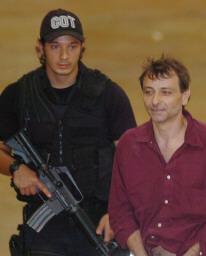Italy is confident of reversing a controversial Brazilian decision to grant asylum to an ex-terrorist convicted of four murders.
Foreign Minister Franco Frattini said he was ''sure'' Brazil's supreme court will next week overturn the justice minister's recent decision on Cesare Battisti.
The court will examine the case on Wednesday February 2.
Frattini said Italy would ''use all the juridical instruments at our disposal under Brazilian law'' in appealing to the court.
''We are convinced we will be able to get the decision overturned,'' he said.
The foreign minister noted that Brazilian President Luiz Ignacio Lula da Silva recently said the case was closed ''for the government''.
''(But) the supreme court is not the government,'' Frattini pointed out.
Frattini also poured scorn on Battisti's claim a French spy gave him the idea of fleeing from France to Brazil.
''It's the usual distasteful way of revealing things that can never be proved,'' Frattini said.
''I cannot believe it. It is clear that a country like France can't be implicated, unless evidence emerges, and such evidence will never emerge''.
Frattini said the claim, made in a Brazilian magazine interview, was ''further proof of the moral standing of this person'' and provided ''one more reason to bring him home''.
''The idea of my flight to Brazil (came) from a member of the French secret service,'' Battisti told the magazine, Istoe.
The ex-terrorist disappeared from France in 2004 while awaiting the result of an appeal against his extradition, amid protests from French leftwing media and intellectuals.
He was recently granted political asylum in Brazil, sparking protests from Italy which voiced outrage at the notion that Battisti would be ''persecuted'' if sent home.
Italy has recalled its ambassador and is mulling further moves, including the supreme court appeal.
There have been calls for Italy to pull out of a soccer friendly against Brazil in London on February 10.
Defence Minister Ignazio La Russa reiterated the call Thursday. Youth Minister Giorgia Meloni said that if the match did go ahead, Italy should wear black arm bands to remember Battisti's victims.
'NEVER MURDERED ANYONE'.
In the interview, Battisti denied ever having murdered anyone, claiming he had only taken part in ''military operations'' to fund his leftist militant group PAC.
He also claimed that the son of one of his victims was being ''pressured'' by the Italian government to campaign for his extradition.
Battisti, 54, who became a successful crime writer during his 15 years in France, claimed that he had exchanged ''friendly'' letters with Alberto Torregiani, who has been wheelchair-bound since a PAC attack in 1979 that killed his jeweler father.
''They (the government) are putting pressure on him because they can take his pension away,'' Battisti said.
He also described the route he took from France to Brazil, via Spain, Portugal, Madeira, the Canary Islands and Cape Verde.
Battisti told the magazine Brazil's justice minister had been ''brave'' and it was ''time for Italy to re-read its history''.
Earlier Thursday the European Commission said it could not intervene in the case, which was governed only by bilateral accords.
The EC cannot intervene, a spokesman for Justice Commissioner Jacques Barrot said, because the EU does not have a relevant accord with Brazil.
The only relevant legal document is a 1989 bilateral accord between the two countries, he said.
The EC was replying to an open letter from Italian European Affairs Minister Andrea Ronchi who urged the Commission to step in if Brazil keeps refusing to extradite Battisti.









